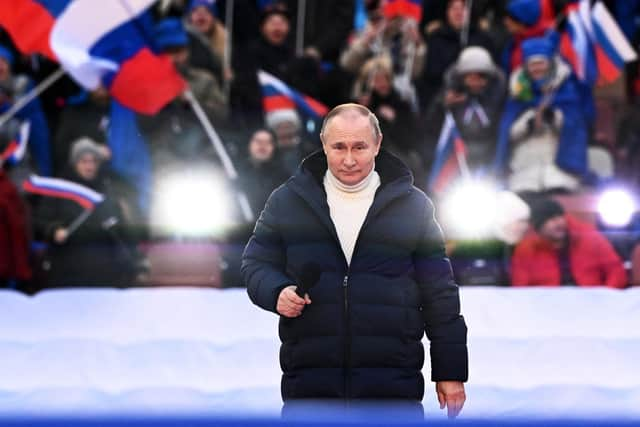Ukraine-Russia war: Vladimir Putin's atrocities justify a prosecution, but how do you get him in the dock? – Martyn McLaughlin
A war instigated with no justification is being escalated by Putin and Putin alone. He has rejected all efforts to bring the conflict to an end, and exhibited a bloodlust which defies any rational engagement.
After more than three weeks, it seems the only way it can end is by securing his conviction for a host of atrocities. The US president, Joe Biden, has described Putin as a war criminal, and Foreign Secretary Liz Truss has said there is “very, very strong” evidence of war crimes being committed in Ukraine.
Advertisement
Hide AdAdvertisement
Hide AdShe added: “It is ultimately a matter for the International Criminal Court to decide who is or isn't a war criminal, and for us to bring the evidence.”
That may be true, but even getting to the stage where a prosecution is brought against Putin is far from straightforward.
It is notoriously difficult for prosecutors to prove intent to commit war crimes – out of 45 people indicted at the ICC, ten have ended with convictions. The burden of proof in the court of public opinion is considerably lower than it is in the Hague, with time-consuming groundwork, such as verifying video evidence, required.
In this instance, however, the evidence does not appear to be the main stumbling block. It is hard to see how Putin’s brazen assault on the sovereignty and territorial integrity of Ukraine would not be classed as a war crime. That much was plain as far back as 2014.


The daily atrocities being committed in the besieged city of Mariupol and elsewhere have changed the game. Russia’s targets have included a maternity hospital, a shopping centre, and a theatre where children were taking shelter. Both actions, individually and collectively, merely reinforce the case against Putin, and bring clarity to the argument that he has violated the very foundations of the global legal order.
The ICC’s chief prosecutor, Karim Khan QC, said there was a reasonable basis to believe that war crimes and crimes against humanity had been committed in Ukraine – and that was in the last week of February, long before a spate of devastating attacks on civilian facilities across the country.
Geoffrey Robertson QC, the noted human rights barrister, has since argued that Mr Khan and his team “should have no difficulty proving that the invasion of Ukraine was an act of aggression, given its scale and appalling consequences in death and destruction.”
He added: “The prosecutor would only need to call evidence of these facts: a Ukrainian government minister, a few victims who witnessed or were injured in the bombings, and transcripts of Putin's own public speeches. There would be ample photographic evidence to provide proof.”
Advertisement
Hide AdAdvertisement
Hide AdThe ICC, which is already gathering evidence on the ground in Ukraine, then must determine whether Russia’s actions tally with the offences it prosecutes – namely, war crimes, genocide, crimes against humanity, and the crime of aggression. The fact that 41 countries have referred Russia’s atrocities in Ukraine to the ICC provides added impetus and resources for that task.
The latter offence, adopted by the court four years ago, is arguably the most important one. It empowers it to take action against the planning, preparation and execution by a state, military or political leader “of an act of aggression which, by its character, gravity and scale, constitutes a manifest violation of the charter of the United Nations”.
Significantly, Putin himself would be directly open to prosecution for crimes of aggression – the ICC specifies that the offence applies only to the highest ranking leaders who “exercise control over” or “direct the political or military action of a state”.
The problem, however, is how to square the circle. Russia may have signed the Rome statute, which governs the ICC, in 2000, but it never ratified the agreement to become a member. Six years ago, meanwhile, it formally withdrew its signature from the founding statute, a day after the court published a report classifying the Russian annexation of Crimea as an occupation.
That is a difficulty, though it is not insurmountable – the ICC is able to exercise jurisdiction over Ukraine, and anyone suspected of committing abuses in that territory, irrespective of their nationality – that means it can investigate Russian commanders waging the war in Ukraine and, in theory, Putin himself.
The bigger problem is the fact that Russia is a permanent member of the UN Security Council, and would be able to wield its veto, if and when the council made a referral to the court.
It remains the case that the ICC could seek to hold Putin to account for other war crimes, but the question then is how it would go about doing so in practice. The court has never tried someone in absentia, and the Rome statute appears to expressly reject such a possibility.
In order for Putin to appear at the Hague, Russia would have to turn him over, or he would have to be arrested in a foreign state that is a signatory to the treaty. At present, neither scenario looks likely.
Advertisement
Hide AdAdvertisement
Hide AdThere are other scenarios in play. Ukraine already filed a petition against Russia in the International Court of Justice, but that is not a criminal court.
The most interesting proposition is the idea of a special international tribunal charged with investigating Putin. The idea, backed by former prime ministers Gordon Brown and Sir John Major, is a way of overcoming the loophole in the law which limits the ICC’s jurisdiction.
It is a bold and welcome idea. It too, however, is hamstrung by the obvious problem of how you apprehend Putin and physically put him in a dock. Until that issue is resolved, the bloodshed and the suffering will continue.
